人教版(2019) 必修第一册UNIT 2TRAVELLING AROUND Section ⅡDiscovering Useful Structures课时练习(含答案)
文档属性
| 名称 | 人教版(2019) 必修第一册UNIT 2TRAVELLING AROUND Section ⅡDiscovering Useful Structures课时练习(含答案) | 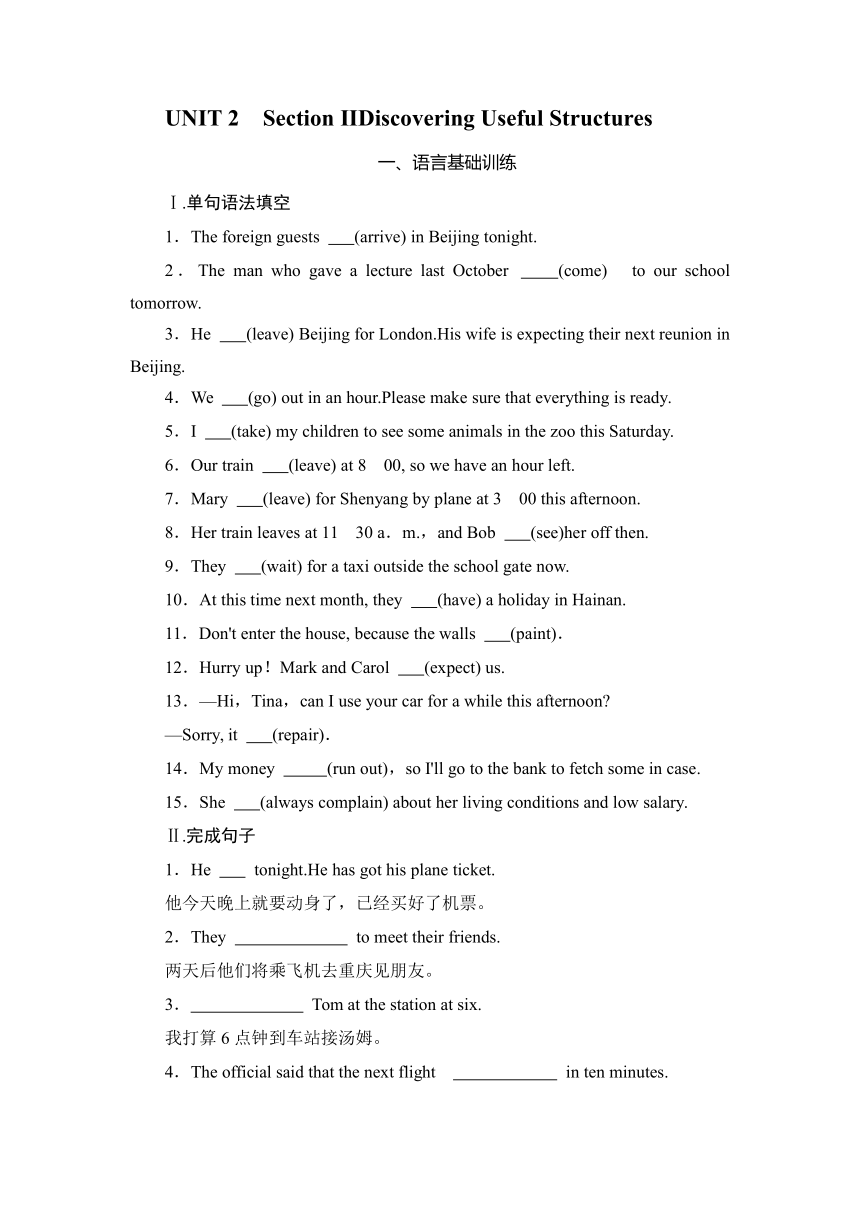 | |
| 格式 | doc | ||
| 文件大小 | 77.5KB | ||
| 资源类型 | 教案 | ||
| 版本资源 | 人教版(2019) | ||
| 科目 | 英语 | ||
| 更新时间 | 2023-08-24 15:55:52 | ||
图片预览

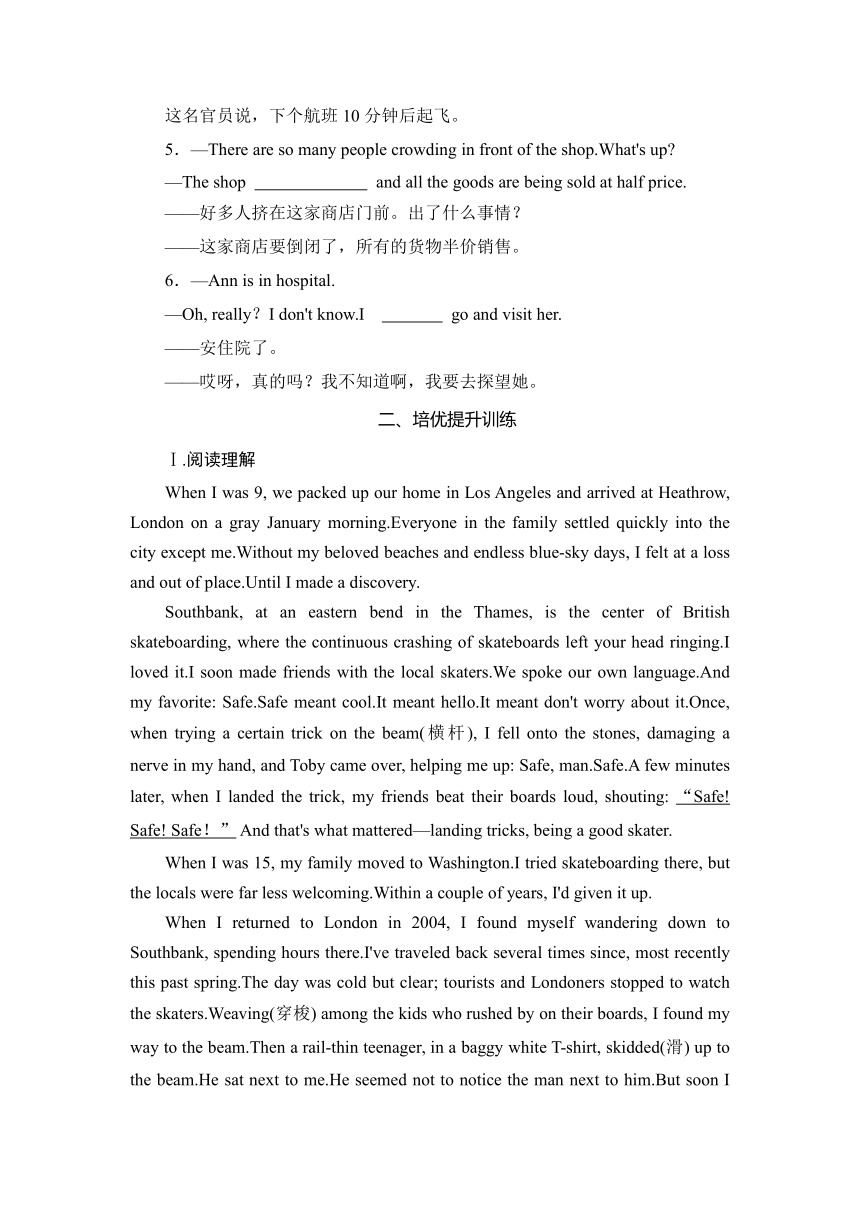
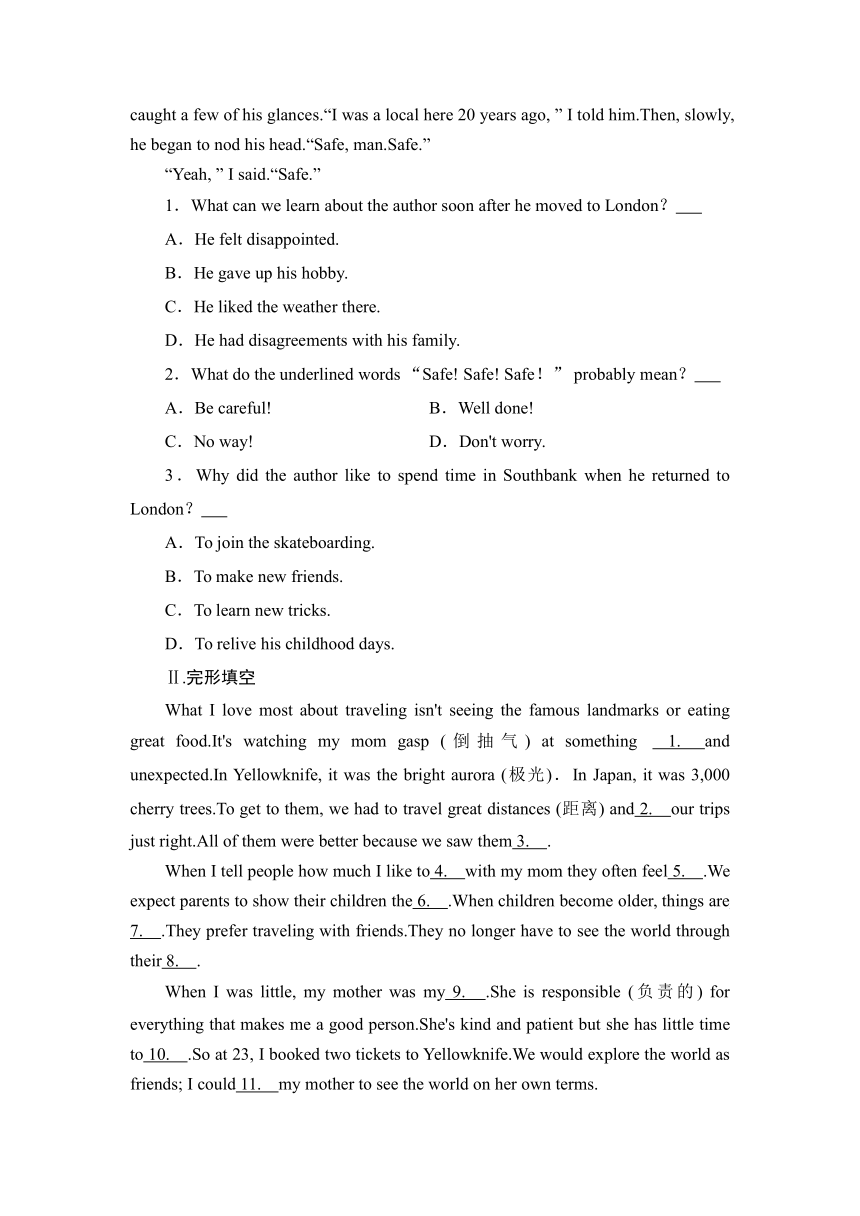
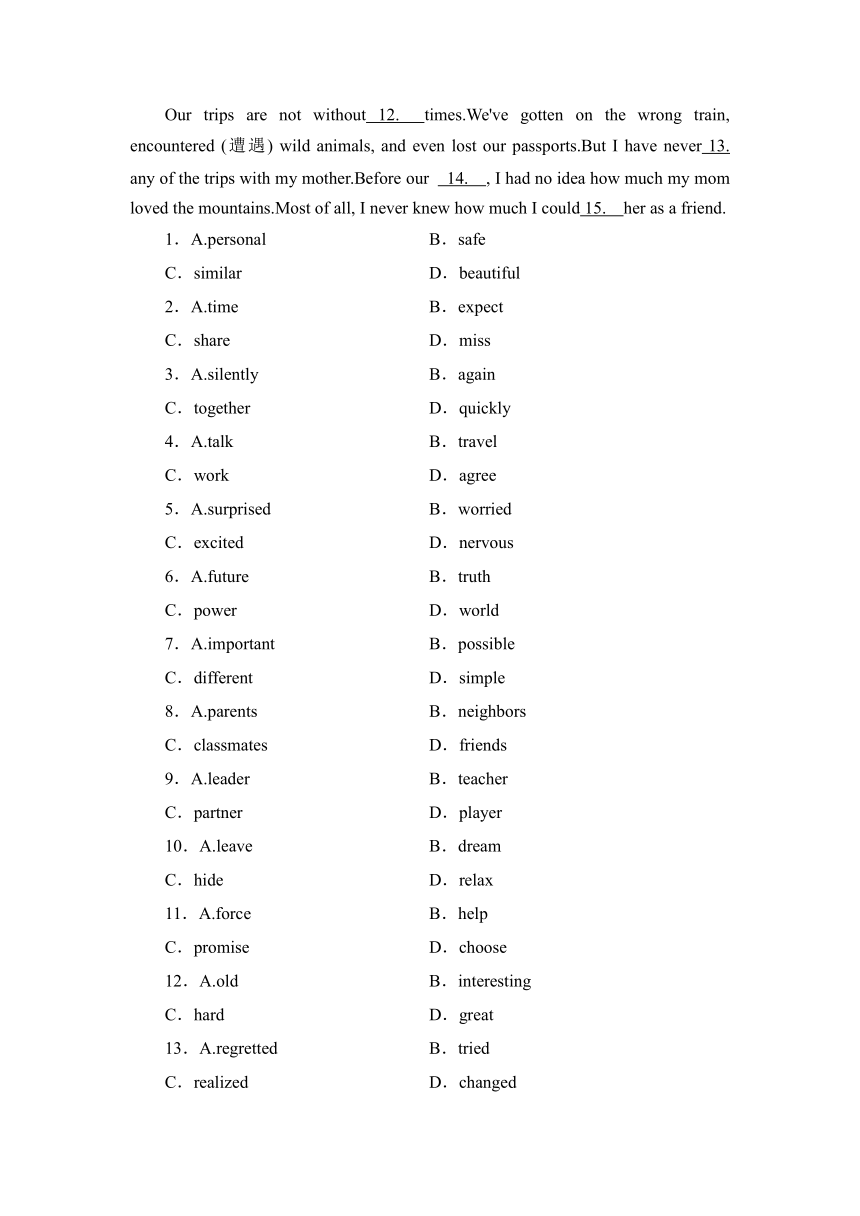
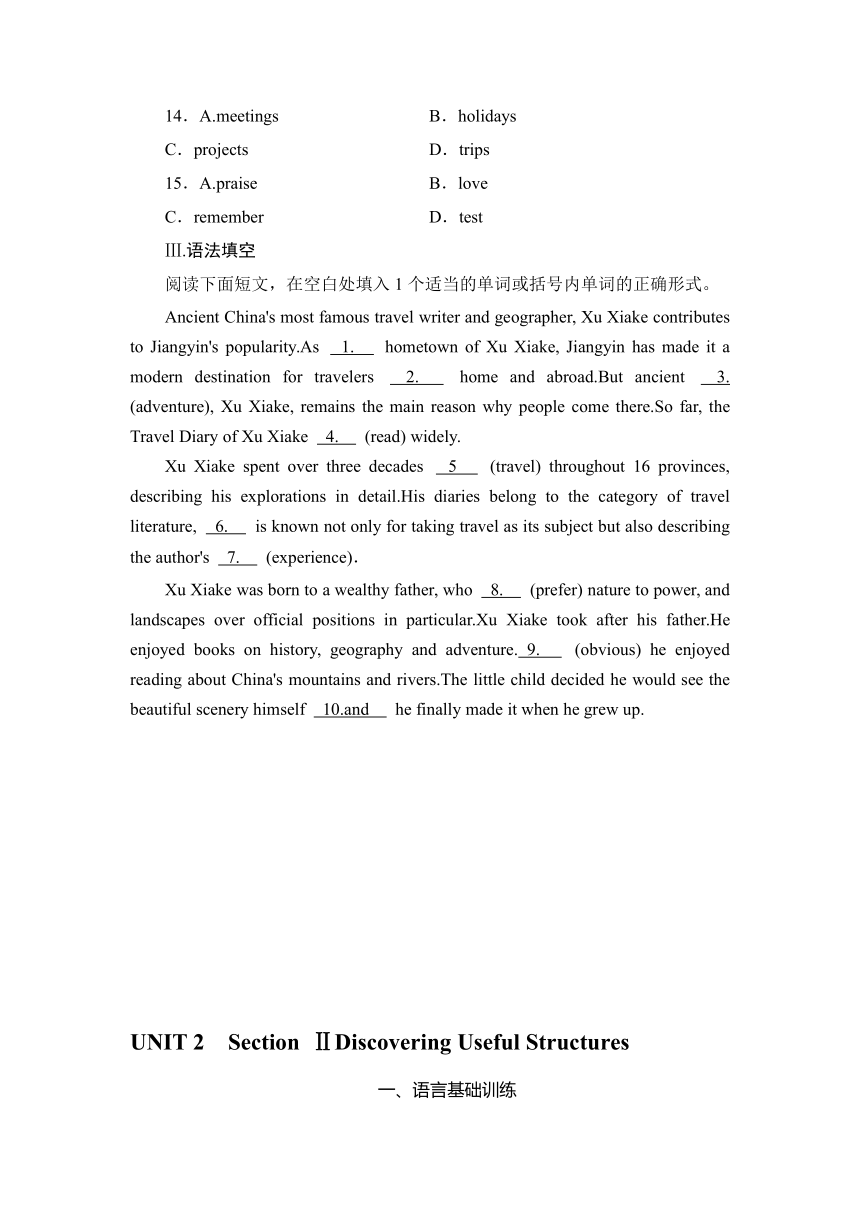
文档简介
UNIT 2 Section ⅡDiscovering Useful Structures
一、语言基础训练
Ⅰ.单句语法填空
1.The foreign guests (arrive) in Beijing tonight.
2.The man who gave a lecture last October (come) to our school tomorrow.
3.He (leave) Beijing for London.His wife is expecting their next reunion in Beijing.
4.We (go) out in an hour.Please make sure that everything is ready.
5.I (take) my children to see some animals in the zoo this Saturday.
6.Our train (leave) at 8?00, so we have an hour left.
7.Mary (leave) for Shenyang by plane at 3?00 this afternoon.
8.Her train leaves at 11?30 a.m.,and Bob (see)her off then.
9.They (wait) for a taxi outside the school gate now.
10.At this time next month, they (have) a holiday in Hainan.
11.Don't enter the house, because the walls (paint).
12.Hurry up!Mark and Carol (expect) us.
13.—Hi,Tina,can I use your car for a while this afternoon
—Sorry, it (repair).
14.My money (run out),so I'll go to the bank to fetch some in case.
15.She (always complain) about her living conditions and low salary.
Ⅱ.完成句子
1.He tonight.He has got his plane ticket.
他今天晚上就要动身了,已经买好了机票。
2.They to meet their friends.
两天后他们将乘飞机去重庆见朋友。
3. Tom at the station at six.
我打算6点钟到车站接汤姆。
4.The official said that the next flight in ten minutes.
这名官员说,下个航班10分钟后起飞。
5.—There are so many people crowding in front of the shop.What's up
—The shop and all the goods are being sold at half price.
——好多人挤在这家商店门前。出了什么事情?
——这家商店要倒闭了,所有的货物半价销售。
6.—Ann is in hospital.
—Oh, really?I don't know.I go and visit her.
——安住院了。
——哎呀,真的吗?我不知道啊,我要去探望她。
二、培优提升训练
Ⅰ.阅读理解
When I was 9, we packed up our home in Los Angeles and arrived at Heathrow, London on a gray January morning.Everyone in the family settled quickly into the city except me.Without my beloved beaches and endless blue-sky days, I felt at a loss and out of place.Until I made a discovery.
Southbank, at an eastern bend in the Thames, is the center of British skateboarding, where the continuous crashing of skateboards left your head ringing.I loved it.I soon made friends with the local skaters.We spoke our own language.And my favorite: Safe.Safe meant cool.It meant hello.It meant don't worry about it.Once, when trying a certain trick on the beam(横杆), I fell onto the stones, damaging a nerve in my hand, and Toby came over, helping me up: Safe, man.Safe.A few minutes later, when I landed the trick, my friends beat their boards loud, shouting: “Safe! Safe! Safe!” And that's what mattered—landing tricks, being a good skater.
When I was 15, my family moved to Washington.I tried skateboarding there, but the locals were far less welcoming.Within a couple of years, I'd given it up.
When I returned to London in 2004, I found myself wandering down to Southbank, spending hours there.I've traveled back several times since, most recently this past spring.The day was cold but clear; tourists and Londoners stopped to watch the skaters.Weaving(穿梭) among the kids who rushed by on their boards, I found my way to the beam.Then a rail-thin teenager, in a baggy white T-shirt, skidded(滑) up to the beam.He sat next to me.He seemed not to notice the man next to him.But soon I caught a few of his glances.“I was a local here 20 years ago, ” I told him.Then, slowly, he began to nod his head.“Safe, man.Safe.”
“Yeah, ” I said.“Safe.”
1.What can we learn about the author soon after he moved to London?
A.He felt disappointed.
B.He gave up his hobby.
C.He liked the weather there.
D.He had disagreements with his family.
2.What do the underlined words “Safe! Safe! Safe!” probably mean?
A.Be careful! B.Well done!
C.No way! D.Don't worry.
3.Why did the author like to spend time in Southbank when he returned to London?
A.To join the skateboarding.
B.To make new friends.
C.To learn new tricks.
D.To relive his childhood days.
Ⅱ.完形填空
What I love most about traveling isn't seeing the famous landmarks or eating great food.It's watching my mom gasp (倒抽气) at something 1. and unexpected.In Yellowknife, it was the bright aurora (极光).In Japan, it was 3,000 cherry trees.To get to them, we had to travel great distances (距离) and 2. our trips just right.All of them were better because we saw them 3. .
When I tell people how much I like to 4. with my mom they often feel 5. .We expect parents to show their children the 6. .When children become older, things are 7. .They prefer traveling with friends.They no longer have to see the world through their 8. .
When I was little, my mother was my 9. .She is responsible (负责的) for everything that makes me a good person.She's kind and patient but she has little time to 10. .So at 23, I booked two tickets to Yellowknife.We would explore the world as friends; I could 11. my mother to see the world on her own terms.
Our trips are not without 12. times.We've gotten on the wrong train, encountered (遭遇) wild animals, and even lost our passports.But I have never 13. any of the trips with my mother.Before our 14. , I had no idea how much my mom loved the mountains.Most of all, I never knew how much I could 15. her as a friend.
1.A.personal B.safe
C.similar D.beautiful
2.A.time B.expect
C.share D.miss
3.A.silently B.again
C.together D.quickly
4.A.talk B.travel
C.work D.agree
5.A.surprised B.worried
C.excited D.nervous
6.A.future B.truth
C.power D.world
7.A.important B.possible
C.different D.simple
8.A.parents B.neighbors
C.classmates D.friends
9.A.leader B.teacher
C.partner D.player
10.A.leave B.dream
C.hide D.relax
11.A.force B.help
C.promise D.choose
12.A.old B.interesting
C.hard D.great
13.A.regretted B.tried
C.realized D.changed
14.A.meetings B.holidays
C.projects D.trips
15.A.praise B.love
C.remember D.test
Ⅲ.语法填空
阅读下面短文,在空白处填入1个适当的单词或括号内单词的正确形式。
Ancient China's most famous travel writer and geographer, Xu Xiake contributes to Jiangyin's popularity.As 1. hometown of Xu Xiake, Jiangyin has made it a modern destination for travelers 2. home and abroad.But ancient 3. (adventure), Xu Xiake, remains the main reason why people come there.So far, the Travel Diary of Xu Xiake 4. (read) widely.
Xu Xiake spent over three decades 5 (travel) throughout 16 provinces, describing his explorations in detail.His diaries belong to the category of travel literature, 6. is known not only for taking travel as its subject but also describing the author's 7. (experience).
Xu Xiake was born to a wealthy father, who 8. (prefer) nature to power, and landscapes over official positions in particular.Xu Xiake took after his father.He enjoyed books on history, geography and adventure. 9. (obvious) he enjoyed reading about China's mountains and rivers.The little child decided he would see the beautiful scenery himself 10.and he finally made it when he grew up.
UNIT 2 Section ⅡDiscovering Useful Structures
一、语言基础训练
Ⅰ.单句语法填空
1.The foreign guests are arriving (arrive) in Beijing tonight.
2.The man who gave a lecture last October is coming (come) to our school tomorrow.
3.He is leaving (leave) Beijing for London.His wife is expecting their next reunion in Beijing.
4.We are going (go) out in an hour.Please make sure that everything is ready.
5.I am taking (take) my children to see some animals in the zoo this Saturday.
6.Our train is leaving (leave) at 8?00, so we have an hour left.
7.Mary is leaving (leave) for Shenyang by plane at 3?00 this afternoon.
8.Her train leaves at 11?30 a.m.,and Bob is seeing (see)her off then.
9.They are waiting (wait) for a taxi outside the school gate now.
10.At this time next month, they will be having (have) a holiday in Hainan.
11.Don't enter the house, because the walls are being painted (paint).
12.Hurry up!Mark and Carol are expecting (expect) us.
13.—Hi,Tina,can I use your car for a while this afternoon
—Sorry, it is being repaired (repair).
14.My money is running out (run out),so I'll go to the bank to fetch some in case.
15.She is always complaining (always complain) about her living conditions and low salary.
Ⅱ.完成句子
1.He is leaving tonight.He has got his plane ticket.
他今天晚上就要动身了,已经买好了机票。
2.They are flying to Chongqing in two days to meet their friends.
两天后他们将乘飞机去重庆见朋友。
3. I'm going to meet Tom at the station at six.
我打算6点钟到车站接汤姆。
4.The official said that the next flight was taking off/would take off in ten minutes.
这名官员说,下个航班10分钟后起飞。
5.—There are so many people crowding in front of the shop.What's up
—The shop is closing down and all the goods are being sold at half price.
——好多人挤在这家商店门前。出了什么事情?
——这家商店要倒闭了,所有的货物半价销售。
6.—Ann is in hospital.
—Oh, really?I don't know.I will go and visit her.
——安住院了。
——哎呀,真的吗?我不知道啊,我要去探望她。
二、培优提升训练
Ⅰ.阅读理解
When I was 9, we packed up our home in Los Angeles and arrived at Heathrow, London on a gray January morning.Everyone in the family settled quickly into the city except me.Without my beloved beaches and endless blue-sky days, I felt at a loss and out of place.Until I made a discovery.
Southbank, at an eastern bend in the Thames, is the center of British skateboarding, where the continuous crashing of skateboards left your head ringing.I loved it.I soon made friends with the local skaters.We spoke our own language.And my favorite: Safe.Safe meant cool.It meant hello.It meant don't worry about it.Once, when trying a certain trick on the beam(横杆), I fell onto the stones, damaging a nerve in my hand, and Toby came over, helping me up: Safe, man.Safe.A few minutes later, when I landed the trick, my friends beat their boards loud, shouting: “Safe! Safe! Safe!” And that's what mattered—landing tricks, being a good skater.
When I was 15, my family moved to Washington.I tried skateboarding there, but the locals were far less welcoming.Within a couple of years, I'd given it up.
When I returned to London in 2004, I found myself wandering down to Southbank, spending hours there.I've traveled back several times since, most recently this past spring.The day was cold but clear; tourists and Londoners stopped to watch the skaters.Weaving(穿梭) among the kids who rushed by on their boards, I found my way to the beam.Then a rail-thin teenager, in a baggy white T-shirt, skidded(滑) up to the beam.He sat next to me.He seemed not to notice the man next to him.But soon I caught a few of his glances.“I was a local here 20 years ago, ” I told him.Then, slowly, he began to nod his head.“Safe, man.Safe.”
“Yeah, ” I said.“Safe.”
文章大意:本文是一篇记叙文。作者回忆小时候在英国南岸这个伦敦滑板手们的圣地以及和他们一块度过的美好时光。
1.What can we learn about the author soon after he moved to London? A
A.He felt disappointed.
B.He gave up his hobby.
C.He liked the weather there.
D.He had disagreements with his family.
解析: 推理判断题。根据题干关键词 “after he moved to London” 定位在原文第一段“Without my beloved beaches and endless blue-sky days, I felt at a loss and out of place.(没有我心爱的海滩和无尽的蓝天,我感到不知所措和格格不入。)”所以,作者是失望的。故选A。
2.What do the underlined words “Safe! Safe! Safe!” probably mean? B
A.Be careful! B.Well done!
C.No way! D.Don't worry.
解析: 词义猜测题。根据题干关键词 “Safe! Safe! Safe!”定位在原文第二段 “And that's what mattered—landing tricks, being a good skater.(这就是重要的着陆技巧,成为一名优秀的滑冰运动员。)”表示做得好,所以应该是鼓励的话语。故选B。
3.Why did the author like to spend time in Southbank when he returned to London? D
A.To join the skateboarding.
B.To make new friends.
C.To learn new tricks.
D.To relive his childhood days.
解析: 细节理解题。根据题干关键词 “when he returned to London” 定位在原文第四段 “When I returned to London in 2004, I found myself wandering down to Southbank, spending hours there.(当我2004年回到伦敦时,我发现自己在南岸漫步,在那里待了几个小时。)”所以这里是漫步,重温童年时光。故选D。
Ⅱ.完形填空
What I love most about traveling isn't seeing the famous landmarks or eating great food.It's watching my mom gasp (倒抽气) at something 1.D and unexpected.In Yellowknife, it was the bright aurora (极光).In Japan, it was 3,000 cherry trees.To get to them, we had to travel great distances (距离) and 2.A our trips just right.All of them were better because we saw them 3.C .
When I tell people how much I like to 4.B with my mom they often feel 5.A .We expect parents to show their children the 6.D .When children become older, things are 7.C .They prefer traveling with friends.They no longer have to see the world through their 8.A .
When I was little, my mother was my 9.B .She is responsible (负责的) for everything that makes me a good person.She's kind and patient but she has little time to 10.D .So at 23, I booked two tickets to Yellowknife.We would explore the world as friends; I could 11.B my mother to see the world on her own terms.
Our trips are not without 12.C times.We've gotten on the wrong train, encountered (遭遇) wild animals, and even lost our passports.But I have never 13.A any of the trips with my mother.Before our 14.D , I had no idea how much my mom loved the mountains.Most of all, I never knew how much I could 15.B her as a friend.
文章大意:本文为一篇记叙文。文章讲述了作者喜欢带母亲一起去旅行的故事和作者对于此的看法。
1.A.personal B.safe
C.similar D.beautiful
解析: 考查形容词词义辨析。句意:它是看着我妈妈对一些美丽而意想不到的东西倒吸气。A.personal个人的;B.safe安全的;C.similar相似的;D.beautiful漂亮的。根据后文“In Yellowknife, it was the bright aurora(极光). In Japan, it was 3,000 cherry trees.”可知,此处表示美丽而又意外的东西。故选D项。
2.A.time B.expect
C.share D.miss
解析: 考查动词词义辨析。句意:为了到达那里,我们必须长途跋涉,并把旅行的时间安排得恰到好处。A.time为……安排时间;B.expect期待;C.share分享;D.miss错过。根据“To get to them, we had to travel great distances(距离)”和“just right”可知,为了到达目的地,作者和母亲需要合理安排时间。故选A项。
3.A.silently B.again
C.together D.quickly
解析: 考查副词词义辨析。句意:它们都变得更好了,因为我们是一起看的。A.silently寂静地;B.again再次;C.together一起;D.quickly快速地。根据上文“It's watching my mom gasp(倒抽气)”可知,作者和母亲一起看了美丽的风景。故选C项。
4.A.talk B.travel
C.work D.agree
解析: 考查动词词义辨析。句意:当我告诉人们我有多喜欢和妈妈一起旅行时,他们经常感到惊讶。A.talk交谈;B.travel旅行;C.work工作;D.agree同意。根据第一段内容可知,作者喜欢和母亲一起去旅行。故选B项。
5.A.surprised B.worried
C.excited D.nervous
解析: 考查形容词词义辨析。句意同上。A.surprised惊讶的;B.worried担忧的;C.excited激动的;D.nervous紧张的。根据下文“They prefer traveling with friends.”可知,孩子长大了喜欢和朋友去旅行,因此,当听见作者喜欢和母亲一起旅行时,人们是惊讶的。故选A项。
6.A.future B.truth
C.power D.world
解析: 考查名词词义辨析。句意:我们期望父母带孩子去看世界。A.future未来;B.truth真相;C.power能力;D.world世界。根据下文“see the world”可知,我们希望父母带着孩子去看世界。故选D项。
7.A.important B.possible
C.different D.simple
解析: 考查形容词词义辨析。句意:当孩子们长大了,事情就不同了。A.important重要的;B.possible可能的;C.different不同的;D.simple简单的。根据下文“They prefer traveling with friends.They no longer have to see the world through their 8. .”可知,当孩子长大了,事情就不同了。故选C项。
8.A.parents B.neighbors
C.classmates D.friends
解析: 考查名词词义辨析。句意:他们不再需要通过父母看世界。A.parents父母;B.neighbors邻居;C.classmates同班同学;D.friends朋友。根据“expect parents to show their children the 6. ”可知,当孩子们长大了,不再需要通过父母看世界了。故选A项。
9.A.leader B.teacher
C.partner D.player
解析: 考查名词词义辨析。句意:当我小的时候,我母亲是我的老师。A.leader领导者;B.teacher老师;C.partner伙伴;D.player选手。根据下文“She is responsible (负责的) for everything that makes me a good person.”可知,小的时候,作者母亲是作者的老师。故选B项。
10.A.leave B.dream
C.hide D.relax
解析: 考查动词词义辨析。句意:她善良而有耐心,但她很少有时间放松。A.leave离开;B.dream梦想;C.hide躲藏;D.relax使……放松。根据下文“So at 23, I booked two tickets to Yellowknife.We would explore the world as friends”可知,作者母亲很少有时间放松,因此,作者订了票带她去旅游。故选D项。
11.A.force B.help
C.promise D.choose
解析: 考查动词词义辨析。句意:我可以帮助我母亲用她自己的方式看世界。A.force强迫;B.help帮助;C.promise承诺;D.choose选择。根据上文“So at 23, I booked two tickets to Yellowknife.”可知,作者打算帮助母亲看看世界。故选B项。
12.A.old B.interesting
C.hard D.great
解析: 考查形容词词义辨析。句意:我们的旅行并非一帆风顺。A.old老的;B.interesting有趣的;C.hard艰难的;D.great伟大的。根据下文“We've gotten on the wrong train, encountered (遭遇) wild animals,and even lost our passports.”可知,作者和母亲的旅行也遇到过困难,也是艰难的。故选C项。
13.A.regretted B.tried
C.realized D.changed
解析: 考查动词词义辨析。句意:但我从来没有后悔过和母亲一起去旅行。A.regretted后悔;B.tried尝试;C.realized意识到;D.changed改变。根据文章第一段描述可知,作者喜欢和母亲一起旅行,因此,虽然遇到了困难,但是从来没有后悔和她一起旅行。故选A项。
14.A.meetings B.holidays
C.projects D.trips
解析: 考查名词词义辨析。句意:在我们旅行之前,我不知道我母亲有多爱山。A.meetings会议;B.holidays假期;C.projects计划;D.trips旅行。根据前文“any of the trips with my mother”可知,在和母亲旅行前,作者不知道她有多爱山。故选D项。
15.A.praise B.love
C.remember D.test
解析: 考查动词词义辨析。句意:最重要的是,我从来不知道,我可以如此作为一个朋友那样爱她。A.praise赞扬;B.love爱;C.remember记得;D.test测试。根据“as a friend”和语境可知,作者爱母亲,也可以像朋友那样爱她。故选B项。
Ⅲ.语法填空
阅读下面短文,在空白处填入1个适当的单词或括号内单词的正确形式。
Ancient China's most famous travel writer and geographer, Xu Xiake contributes to Jiangyin's popularity.As 1.the hometown of Xu Xiake, Jiangyin has made it a modern destination for travelers 2.at/from home and abroad.But ancient 3.adventurer (adventure), Xu Xiake, remains the main reason why people come there.So far, the Travel Diary of Xu Xiake 4.has been read (read) widely.
Xu Xiake spent over three decades 5.traveling/travelling (travel) throughout 16 provinces, describing his explorations in detail.His diaries belong to the category of travel literature, 6.which is known not only for taking travel as its subject but also describing the author's 7.experiences (experience).
Xu Xiake was born to a wealthy father, who 8.preferred (prefer) nature to power, and landscapes over official positions in particular.Xu Xiake took after his father.He enjoyed books on history, geography and adventure. 9.Obviously (obvious) he enjoyed reading about China's mountains and rivers.The little child decided he would see the beautiful scenery himself 10.and he finally made it when he grew up.
文章大意:本文是一篇说明文。文章介绍了中国古代最著名的旅行作家和地理学家徐霞客的生平。
解析:
1. 考查冠词。句意:作为徐霞客的故乡,江阴已成为国内外游客的现代化旅游目的地。名词hometown后有定语of Xu Xiake修饰,特指,用定冠词the限定。故填the。
2.考查介词。句意:作为徐霞客的故乡,江阴已成为国内外游客的现代化旅游目的地。at home and abroad和from home and abroad是固定搭配,意为“海内外;国内外 ”。故填at/from。
3.考查名词。句意:但古代冒险家徐霞客仍然是人们来这里的主要原因。分析句子可知,提示词在句中作主语,应用名词adventurer,结合单数谓语动词remains可知,主语为单数名词。故填adventurer。
4.考查动词时态语态和主谓一致。句意:至今,《徐霞客游记》已广为传阅。分析句子可知,read(阅读)是句中谓语动词,与主语the Travel Diary of Xu Xiake之间是被动关系,句中有时间状语So far,应使用现在完成时态,又因主语是专有名词,是单数概念,所以谓语动词也应使用单数形式。综上,谓语应用现在完成时的被动语态,单数形式。故填has been read。
5.考查非谓语动词。句意:徐霞客用了30多年的时间走遍了16个省份,详细描述了他的探索。spend...doing...为固定搭配,意为“用/花……做……”,用动名词作宾语。故填traveling/travelling。
6. 考查定语从句。句意:他的日记属于旅行文学的范畴,它不仅以旅行为主题,而且还以描写作者的经历而闻名。分析句子可知,空格处为非限制性定语从句,修饰先行词travel literature,指物,关系词代替先行词在定语从句中作主语,应使用关系代词which引导该定语从句。故填which。
7.考查名词。句意:他的日记属于旅行文学的范畴,它不仅以旅行为主题,而且还以描写作者的经历而闻名。根据句意和空格前名词所有格author's可知,空格处应用名词,结合句意,作者的“经历”是复数概念,用复数形式。故填experiences。
8.考查动词时态。句意:徐霞客有一个富有的父亲,他的父亲喜欢自然胜过权力,尤其是风景胜过官职。分析句子可知,prefer(更喜欢)是定语从句中谓语动词,与主语who(即a wealthy father)之间是主动关系,讲述过去的事情,应使用一般过去时态。故填preferred。
9.考查副词。句意:显然,他喜欢读有关中国山川的书。根据句意,提示词在句中作评注性状语,用副词obviously,意为“显然”,句首单词首字母大写。故填Obviously。
10. 考查连词。句意:这个小孩决定他要自己去看美丽的风景,他长大后终于实现了梦想。结合句意分析句子可知,空格前是两个并列分句,用并列连词and连接。故填and。
一、语言基础训练
Ⅰ.单句语法填空
1.The foreign guests (arrive) in Beijing tonight.
2.The man who gave a lecture last October (come) to our school tomorrow.
3.He (leave) Beijing for London.His wife is expecting their next reunion in Beijing.
4.We (go) out in an hour.Please make sure that everything is ready.
5.I (take) my children to see some animals in the zoo this Saturday.
6.Our train (leave) at 8?00, so we have an hour left.
7.Mary (leave) for Shenyang by plane at 3?00 this afternoon.
8.Her train leaves at 11?30 a.m.,and Bob (see)her off then.
9.They (wait) for a taxi outside the school gate now.
10.At this time next month, they (have) a holiday in Hainan.
11.Don't enter the house, because the walls (paint).
12.Hurry up!Mark and Carol (expect) us.
13.—Hi,Tina,can I use your car for a while this afternoon
—Sorry, it (repair).
14.My money (run out),so I'll go to the bank to fetch some in case.
15.She (always complain) about her living conditions and low salary.
Ⅱ.完成句子
1.He tonight.He has got his plane ticket.
他今天晚上就要动身了,已经买好了机票。
2.They to meet their friends.
两天后他们将乘飞机去重庆见朋友。
3. Tom at the station at six.
我打算6点钟到车站接汤姆。
4.The official said that the next flight in ten minutes.
这名官员说,下个航班10分钟后起飞。
5.—There are so many people crowding in front of the shop.What's up
—The shop and all the goods are being sold at half price.
——好多人挤在这家商店门前。出了什么事情?
——这家商店要倒闭了,所有的货物半价销售。
6.—Ann is in hospital.
—Oh, really?I don't know.I go and visit her.
——安住院了。
——哎呀,真的吗?我不知道啊,我要去探望她。
二、培优提升训练
Ⅰ.阅读理解
When I was 9, we packed up our home in Los Angeles and arrived at Heathrow, London on a gray January morning.Everyone in the family settled quickly into the city except me.Without my beloved beaches and endless blue-sky days, I felt at a loss and out of place.Until I made a discovery.
Southbank, at an eastern bend in the Thames, is the center of British skateboarding, where the continuous crashing of skateboards left your head ringing.I loved it.I soon made friends with the local skaters.We spoke our own language.And my favorite: Safe.Safe meant cool.It meant hello.It meant don't worry about it.Once, when trying a certain trick on the beam(横杆), I fell onto the stones, damaging a nerve in my hand, and Toby came over, helping me up: Safe, man.Safe.A few minutes later, when I landed the trick, my friends beat their boards loud, shouting: “Safe! Safe! Safe!” And that's what mattered—landing tricks, being a good skater.
When I was 15, my family moved to Washington.I tried skateboarding there, but the locals were far less welcoming.Within a couple of years, I'd given it up.
When I returned to London in 2004, I found myself wandering down to Southbank, spending hours there.I've traveled back several times since, most recently this past spring.The day was cold but clear; tourists and Londoners stopped to watch the skaters.Weaving(穿梭) among the kids who rushed by on their boards, I found my way to the beam.Then a rail-thin teenager, in a baggy white T-shirt, skidded(滑) up to the beam.He sat next to me.He seemed not to notice the man next to him.But soon I caught a few of his glances.“I was a local here 20 years ago, ” I told him.Then, slowly, he began to nod his head.“Safe, man.Safe.”
“Yeah, ” I said.“Safe.”
1.What can we learn about the author soon after he moved to London?
A.He felt disappointed.
B.He gave up his hobby.
C.He liked the weather there.
D.He had disagreements with his family.
2.What do the underlined words “Safe! Safe! Safe!” probably mean?
A.Be careful! B.Well done!
C.No way! D.Don't worry.
3.Why did the author like to spend time in Southbank when he returned to London?
A.To join the skateboarding.
B.To make new friends.
C.To learn new tricks.
D.To relive his childhood days.
Ⅱ.完形填空
What I love most about traveling isn't seeing the famous landmarks or eating great food.It's watching my mom gasp (倒抽气) at something 1. and unexpected.In Yellowknife, it was the bright aurora (极光).In Japan, it was 3,000 cherry trees.To get to them, we had to travel great distances (距离) and 2. our trips just right.All of them were better because we saw them 3. .
When I tell people how much I like to 4. with my mom they often feel 5. .We expect parents to show their children the 6. .When children become older, things are 7. .They prefer traveling with friends.They no longer have to see the world through their 8. .
When I was little, my mother was my 9. .She is responsible (负责的) for everything that makes me a good person.She's kind and patient but she has little time to 10. .So at 23, I booked two tickets to Yellowknife.We would explore the world as friends; I could 11. my mother to see the world on her own terms.
Our trips are not without 12. times.We've gotten on the wrong train, encountered (遭遇) wild animals, and even lost our passports.But I have never 13. any of the trips with my mother.Before our 14. , I had no idea how much my mom loved the mountains.Most of all, I never knew how much I could 15. her as a friend.
1.A.personal B.safe
C.similar D.beautiful
2.A.time B.expect
C.share D.miss
3.A.silently B.again
C.together D.quickly
4.A.talk B.travel
C.work D.agree
5.A.surprised B.worried
C.excited D.nervous
6.A.future B.truth
C.power D.world
7.A.important B.possible
C.different D.simple
8.A.parents B.neighbors
C.classmates D.friends
9.A.leader B.teacher
C.partner D.player
10.A.leave B.dream
C.hide D.relax
11.A.force B.help
C.promise D.choose
12.A.old B.interesting
C.hard D.great
13.A.regretted B.tried
C.realized D.changed
14.A.meetings B.holidays
C.projects D.trips
15.A.praise B.love
C.remember D.test
Ⅲ.语法填空
阅读下面短文,在空白处填入1个适当的单词或括号内单词的正确形式。
Ancient China's most famous travel writer and geographer, Xu Xiake contributes to Jiangyin's popularity.As 1. hometown of Xu Xiake, Jiangyin has made it a modern destination for travelers 2. home and abroad.But ancient 3. (adventure), Xu Xiake, remains the main reason why people come there.So far, the Travel Diary of Xu Xiake 4. (read) widely.
Xu Xiake spent over three decades 5 (travel) throughout 16 provinces, describing his explorations in detail.His diaries belong to the category of travel literature, 6. is known not only for taking travel as its subject but also describing the author's 7. (experience).
Xu Xiake was born to a wealthy father, who 8. (prefer) nature to power, and landscapes over official positions in particular.Xu Xiake took after his father.He enjoyed books on history, geography and adventure. 9. (obvious) he enjoyed reading about China's mountains and rivers.The little child decided he would see the beautiful scenery himself 10.and he finally made it when he grew up.
UNIT 2 Section ⅡDiscovering Useful Structures
一、语言基础训练
Ⅰ.单句语法填空
1.The foreign guests are arriving (arrive) in Beijing tonight.
2.The man who gave a lecture last October is coming (come) to our school tomorrow.
3.He is leaving (leave) Beijing for London.His wife is expecting their next reunion in Beijing.
4.We are going (go) out in an hour.Please make sure that everything is ready.
5.I am taking (take) my children to see some animals in the zoo this Saturday.
6.Our train is leaving (leave) at 8?00, so we have an hour left.
7.Mary is leaving (leave) for Shenyang by plane at 3?00 this afternoon.
8.Her train leaves at 11?30 a.m.,and Bob is seeing (see)her off then.
9.They are waiting (wait) for a taxi outside the school gate now.
10.At this time next month, they will be having (have) a holiday in Hainan.
11.Don't enter the house, because the walls are being painted (paint).
12.Hurry up!Mark and Carol are expecting (expect) us.
13.—Hi,Tina,can I use your car for a while this afternoon
—Sorry, it is being repaired (repair).
14.My money is running out (run out),so I'll go to the bank to fetch some in case.
15.She is always complaining (always complain) about her living conditions and low salary.
Ⅱ.完成句子
1.He is leaving tonight.He has got his plane ticket.
他今天晚上就要动身了,已经买好了机票。
2.They are flying to Chongqing in two days to meet their friends.
两天后他们将乘飞机去重庆见朋友。
3. I'm going to meet Tom at the station at six.
我打算6点钟到车站接汤姆。
4.The official said that the next flight was taking off/would take off in ten minutes.
这名官员说,下个航班10分钟后起飞。
5.—There are so many people crowding in front of the shop.What's up
—The shop is closing down and all the goods are being sold at half price.
——好多人挤在这家商店门前。出了什么事情?
——这家商店要倒闭了,所有的货物半价销售。
6.—Ann is in hospital.
—Oh, really?I don't know.I will go and visit her.
——安住院了。
——哎呀,真的吗?我不知道啊,我要去探望她。
二、培优提升训练
Ⅰ.阅读理解
When I was 9, we packed up our home in Los Angeles and arrived at Heathrow, London on a gray January morning.Everyone in the family settled quickly into the city except me.Without my beloved beaches and endless blue-sky days, I felt at a loss and out of place.Until I made a discovery.
Southbank, at an eastern bend in the Thames, is the center of British skateboarding, where the continuous crashing of skateboards left your head ringing.I loved it.I soon made friends with the local skaters.We spoke our own language.And my favorite: Safe.Safe meant cool.It meant hello.It meant don't worry about it.Once, when trying a certain trick on the beam(横杆), I fell onto the stones, damaging a nerve in my hand, and Toby came over, helping me up: Safe, man.Safe.A few minutes later, when I landed the trick, my friends beat their boards loud, shouting: “Safe! Safe! Safe!” And that's what mattered—landing tricks, being a good skater.
When I was 15, my family moved to Washington.I tried skateboarding there, but the locals were far less welcoming.Within a couple of years, I'd given it up.
When I returned to London in 2004, I found myself wandering down to Southbank, spending hours there.I've traveled back several times since, most recently this past spring.The day was cold but clear; tourists and Londoners stopped to watch the skaters.Weaving(穿梭) among the kids who rushed by on their boards, I found my way to the beam.Then a rail-thin teenager, in a baggy white T-shirt, skidded(滑) up to the beam.He sat next to me.He seemed not to notice the man next to him.But soon I caught a few of his glances.“I was a local here 20 years ago, ” I told him.Then, slowly, he began to nod his head.“Safe, man.Safe.”
“Yeah, ” I said.“Safe.”
文章大意:本文是一篇记叙文。作者回忆小时候在英国南岸这个伦敦滑板手们的圣地以及和他们一块度过的美好时光。
1.What can we learn about the author soon after he moved to London? A
A.He felt disappointed.
B.He gave up his hobby.
C.He liked the weather there.
D.He had disagreements with his family.
解析: 推理判断题。根据题干关键词 “after he moved to London” 定位在原文第一段“Without my beloved beaches and endless blue-sky days, I felt at a loss and out of place.(没有我心爱的海滩和无尽的蓝天,我感到不知所措和格格不入。)”所以,作者是失望的。故选A。
2.What do the underlined words “Safe! Safe! Safe!” probably mean? B
A.Be careful! B.Well done!
C.No way! D.Don't worry.
解析: 词义猜测题。根据题干关键词 “Safe! Safe! Safe!”定位在原文第二段 “And that's what mattered—landing tricks, being a good skater.(这就是重要的着陆技巧,成为一名优秀的滑冰运动员。)”表示做得好,所以应该是鼓励的话语。故选B。
3.Why did the author like to spend time in Southbank when he returned to London? D
A.To join the skateboarding.
B.To make new friends.
C.To learn new tricks.
D.To relive his childhood days.
解析: 细节理解题。根据题干关键词 “when he returned to London” 定位在原文第四段 “When I returned to London in 2004, I found myself wandering down to Southbank, spending hours there.(当我2004年回到伦敦时,我发现自己在南岸漫步,在那里待了几个小时。)”所以这里是漫步,重温童年时光。故选D。
Ⅱ.完形填空
What I love most about traveling isn't seeing the famous landmarks or eating great food.It's watching my mom gasp (倒抽气) at something 1.D and unexpected.In Yellowknife, it was the bright aurora (极光).In Japan, it was 3,000 cherry trees.To get to them, we had to travel great distances (距离) and 2.A our trips just right.All of them were better because we saw them 3.C .
When I tell people how much I like to 4.B with my mom they often feel 5.A .We expect parents to show their children the 6.D .When children become older, things are 7.C .They prefer traveling with friends.They no longer have to see the world through their 8.A .
When I was little, my mother was my 9.B .She is responsible (负责的) for everything that makes me a good person.She's kind and patient but she has little time to 10.D .So at 23, I booked two tickets to Yellowknife.We would explore the world as friends; I could 11.B my mother to see the world on her own terms.
Our trips are not without 12.C times.We've gotten on the wrong train, encountered (遭遇) wild animals, and even lost our passports.But I have never 13.A any of the trips with my mother.Before our 14.D , I had no idea how much my mom loved the mountains.Most of all, I never knew how much I could 15.B her as a friend.
文章大意:本文为一篇记叙文。文章讲述了作者喜欢带母亲一起去旅行的故事和作者对于此的看法。
1.A.personal B.safe
C.similar D.beautiful
解析: 考查形容词词义辨析。句意:它是看着我妈妈对一些美丽而意想不到的东西倒吸气。A.personal个人的;B.safe安全的;C.similar相似的;D.beautiful漂亮的。根据后文“In Yellowknife, it was the bright aurora(极光). In Japan, it was 3,000 cherry trees.”可知,此处表示美丽而又意外的东西。故选D项。
2.A.time B.expect
C.share D.miss
解析: 考查动词词义辨析。句意:为了到达那里,我们必须长途跋涉,并把旅行的时间安排得恰到好处。A.time为……安排时间;B.expect期待;C.share分享;D.miss错过。根据“To get to them, we had to travel great distances(距离)”和“just right”可知,为了到达目的地,作者和母亲需要合理安排时间。故选A项。
3.A.silently B.again
C.together D.quickly
解析: 考查副词词义辨析。句意:它们都变得更好了,因为我们是一起看的。A.silently寂静地;B.again再次;C.together一起;D.quickly快速地。根据上文“It's watching my mom gasp(倒抽气)”可知,作者和母亲一起看了美丽的风景。故选C项。
4.A.talk B.travel
C.work D.agree
解析: 考查动词词义辨析。句意:当我告诉人们我有多喜欢和妈妈一起旅行时,他们经常感到惊讶。A.talk交谈;B.travel旅行;C.work工作;D.agree同意。根据第一段内容可知,作者喜欢和母亲一起去旅行。故选B项。
5.A.surprised B.worried
C.excited D.nervous
解析: 考查形容词词义辨析。句意同上。A.surprised惊讶的;B.worried担忧的;C.excited激动的;D.nervous紧张的。根据下文“They prefer traveling with friends.”可知,孩子长大了喜欢和朋友去旅行,因此,当听见作者喜欢和母亲一起旅行时,人们是惊讶的。故选A项。
6.A.future B.truth
C.power D.world
解析: 考查名词词义辨析。句意:我们期望父母带孩子去看世界。A.future未来;B.truth真相;C.power能力;D.world世界。根据下文“see the world”可知,我们希望父母带着孩子去看世界。故选D项。
7.A.important B.possible
C.different D.simple
解析: 考查形容词词义辨析。句意:当孩子们长大了,事情就不同了。A.important重要的;B.possible可能的;C.different不同的;D.simple简单的。根据下文“They prefer traveling with friends.They no longer have to see the world through their 8. .”可知,当孩子长大了,事情就不同了。故选C项。
8.A.parents B.neighbors
C.classmates D.friends
解析: 考查名词词义辨析。句意:他们不再需要通过父母看世界。A.parents父母;B.neighbors邻居;C.classmates同班同学;D.friends朋友。根据“expect parents to show their children the 6. ”可知,当孩子们长大了,不再需要通过父母看世界了。故选A项。
9.A.leader B.teacher
C.partner D.player
解析: 考查名词词义辨析。句意:当我小的时候,我母亲是我的老师。A.leader领导者;B.teacher老师;C.partner伙伴;D.player选手。根据下文“She is responsible (负责的) for everything that makes me a good person.”可知,小的时候,作者母亲是作者的老师。故选B项。
10.A.leave B.dream
C.hide D.relax
解析: 考查动词词义辨析。句意:她善良而有耐心,但她很少有时间放松。A.leave离开;B.dream梦想;C.hide躲藏;D.relax使……放松。根据下文“So at 23, I booked two tickets to Yellowknife.We would explore the world as friends”可知,作者母亲很少有时间放松,因此,作者订了票带她去旅游。故选D项。
11.A.force B.help
C.promise D.choose
解析: 考查动词词义辨析。句意:我可以帮助我母亲用她自己的方式看世界。A.force强迫;B.help帮助;C.promise承诺;D.choose选择。根据上文“So at 23, I booked two tickets to Yellowknife.”可知,作者打算帮助母亲看看世界。故选B项。
12.A.old B.interesting
C.hard D.great
解析: 考查形容词词义辨析。句意:我们的旅行并非一帆风顺。A.old老的;B.interesting有趣的;C.hard艰难的;D.great伟大的。根据下文“We've gotten on the wrong train, encountered (遭遇) wild animals,and even lost our passports.”可知,作者和母亲的旅行也遇到过困难,也是艰难的。故选C项。
13.A.regretted B.tried
C.realized D.changed
解析: 考查动词词义辨析。句意:但我从来没有后悔过和母亲一起去旅行。A.regretted后悔;B.tried尝试;C.realized意识到;D.changed改变。根据文章第一段描述可知,作者喜欢和母亲一起旅行,因此,虽然遇到了困难,但是从来没有后悔和她一起旅行。故选A项。
14.A.meetings B.holidays
C.projects D.trips
解析: 考查名词词义辨析。句意:在我们旅行之前,我不知道我母亲有多爱山。A.meetings会议;B.holidays假期;C.projects计划;D.trips旅行。根据前文“any of the trips with my mother”可知,在和母亲旅行前,作者不知道她有多爱山。故选D项。
15.A.praise B.love
C.remember D.test
解析: 考查动词词义辨析。句意:最重要的是,我从来不知道,我可以如此作为一个朋友那样爱她。A.praise赞扬;B.love爱;C.remember记得;D.test测试。根据“as a friend”和语境可知,作者爱母亲,也可以像朋友那样爱她。故选B项。
Ⅲ.语法填空
阅读下面短文,在空白处填入1个适当的单词或括号内单词的正确形式。
Ancient China's most famous travel writer and geographer, Xu Xiake contributes to Jiangyin's popularity.As 1.the hometown of Xu Xiake, Jiangyin has made it a modern destination for travelers 2.at/from home and abroad.But ancient 3.adventurer (adventure), Xu Xiake, remains the main reason why people come there.So far, the Travel Diary of Xu Xiake 4.has been read (read) widely.
Xu Xiake spent over three decades 5.traveling/travelling (travel) throughout 16 provinces, describing his explorations in detail.His diaries belong to the category of travel literature, 6.which is known not only for taking travel as its subject but also describing the author's 7.experiences (experience).
Xu Xiake was born to a wealthy father, who 8.preferred (prefer) nature to power, and landscapes over official positions in particular.Xu Xiake took after his father.He enjoyed books on history, geography and adventure. 9.Obviously (obvious) he enjoyed reading about China's mountains and rivers.The little child decided he would see the beautiful scenery himself 10.and he finally made it when he grew up.
文章大意:本文是一篇说明文。文章介绍了中国古代最著名的旅行作家和地理学家徐霞客的生平。
解析:
1. 考查冠词。句意:作为徐霞客的故乡,江阴已成为国内外游客的现代化旅游目的地。名词hometown后有定语of Xu Xiake修饰,特指,用定冠词the限定。故填the。
2.考查介词。句意:作为徐霞客的故乡,江阴已成为国内外游客的现代化旅游目的地。at home and abroad和from home and abroad是固定搭配,意为“海内外;国内外 ”。故填at/from。
3.考查名词。句意:但古代冒险家徐霞客仍然是人们来这里的主要原因。分析句子可知,提示词在句中作主语,应用名词adventurer,结合单数谓语动词remains可知,主语为单数名词。故填adventurer。
4.考查动词时态语态和主谓一致。句意:至今,《徐霞客游记》已广为传阅。分析句子可知,read(阅读)是句中谓语动词,与主语the Travel Diary of Xu Xiake之间是被动关系,句中有时间状语So far,应使用现在完成时态,又因主语是专有名词,是单数概念,所以谓语动词也应使用单数形式。综上,谓语应用现在完成时的被动语态,单数形式。故填has been read。
5.考查非谓语动词。句意:徐霞客用了30多年的时间走遍了16个省份,详细描述了他的探索。spend...doing...为固定搭配,意为“用/花……做……”,用动名词作宾语。故填traveling/travelling。
6. 考查定语从句。句意:他的日记属于旅行文学的范畴,它不仅以旅行为主题,而且还以描写作者的经历而闻名。分析句子可知,空格处为非限制性定语从句,修饰先行词travel literature,指物,关系词代替先行词在定语从句中作主语,应使用关系代词which引导该定语从句。故填which。
7.考查名词。句意:他的日记属于旅行文学的范畴,它不仅以旅行为主题,而且还以描写作者的经历而闻名。根据句意和空格前名词所有格author's可知,空格处应用名词,结合句意,作者的“经历”是复数概念,用复数形式。故填experiences。
8.考查动词时态。句意:徐霞客有一个富有的父亲,他的父亲喜欢自然胜过权力,尤其是风景胜过官职。分析句子可知,prefer(更喜欢)是定语从句中谓语动词,与主语who(即a wealthy father)之间是主动关系,讲述过去的事情,应使用一般过去时态。故填preferred。
9.考查副词。句意:显然,他喜欢读有关中国山川的书。根据句意,提示词在句中作评注性状语,用副词obviously,意为“显然”,句首单词首字母大写。故填Obviously。
10. 考查连词。句意:这个小孩决定他要自己去看美丽的风景,他长大后终于实现了梦想。结合句意分析句子可知,空格前是两个并列分句,用并列连词and连接。故填and。
